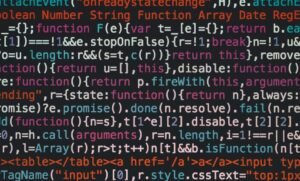What Are the Best AI Tools?
Artificial Intelligence (AI) has become an integral part of various industries, and businesses are leveraging its potential to gain a competitive edge. AI tools are essential for developing intelligent systems that automate tasks, process data, and make predictions. With the many AI tools available in the market, it can be overwhelming to choose the right one for your specific needs. This article explores some of the best AI tools that offer unique features and functionalities.
Key Takeaways:
- AI tools are crucial for automating tasks, processing data, and making predictions.
- Choosing the right AI tool can be challenging due to the variety available.
- We will explore some of the best AI tools in this article to help you make an informed decision.
1. TensorFlow: TensorFlow is a widely-used, open-source framework for building machine learning models. It offers a vast array of tools and resources, making it suitable for both beginners and experts in AI.
2. PyTorch: PyTorch is another popular open-source deep learning framework that provides dynamic computational graphs. It allows developers to create neural networks with ease and flexibility.
3. IBM Watson: IBM Watson is a powerful AI platform that offers a wide range of tools and services for various industries. It includes natural language processing, computer vision, and predictive analytics capabilities.
Why Choose AI Tools?
AI tools enable businesses to automate repetitive tasks, analyze large amounts of data, and make informed decisions. These tools leverage algorithms and machine learning models to perform complex tasks efficiently.
With AI tools, businesses can reduce costs, improve operational efficiency, and enhance customer experiences.
Top AI Tools for Different Use Cases
Table 1: Comparison of AI Tools
| AI Tool | Features | Use Case |
|---|---|---|
| TensorFlow | Flexible, scalable, and supports various platforms. | Developing machine learning models for image recognition. |
| PyTorch | Dynamic computational graphs and easy debugging. | Creating deep learning models for natural language processing. |
| IBM Watson | Natural language processing, computer vision, and predictive analytics. | Building chatbots or analyzing healthcare data. |
4. H2O.ai: H2O.ai is a leading open-source platform that provides scalable machine learning and deep learning solutions. It offers automated machine learning capabilities, making it suitable for users with minimal coding experience.
5. Microsoft Azure: Microsoft Azure provides a comprehensive AI platform with various tools and services. It offers pre-trained models, data storage, and advanced analytics to build intelligent applications.
Table 2: Comparison of AI Tools (Continued)
| AI Tool | Features | Use Case |
|---|---|---|
| H2O.ai | Automated machine learning and scalability. | Developing predictive models for credit scoring. |
| Microsoft Azure | Pre-trained models and advanced analytics. | Creating intelligent chatbots or analyzing large datasets. |
6. Google Cloud AI Platform: Google Cloud AI Platform offers a suite of AI tools and services for data scientists and developers. It provides a scalable infrastructure and integrated machine learning workflows.
Advantages of AI Tools
AI tools offer several advantages for businesses:
- Automation: AI tools automate repetitive tasks, saving time and reducing human errors.
- Data Analysis: They process large amounts of data quickly and extract valuable insights.
- Improved Decision-Making: AI tools provide accurate predictions and recommendations for informed decision-making.
AI tools empower businesses with automation, data analysis, and improved decision-making capabilities.
Table 3: Comparison of AI Tools (Continued)
| AI Tool | Features | Use Case |
|---|---|---|
| Google Cloud AI Platform | Scalable infrastructure and integrated machine learning workflows. | Developing and deploying machine learning models in the cloud. |
Choosing the best AI tool depends on your specific requirements, budget, and expertise. It is always recommended to evaluate the available options based on factors such as ease of use, community support, and scalability. Remember that the best AI tool for one use case may not be the best for another.
By leveraging the power of AI tools, businesses can unlock the full potential of artificial intelligence and gain a competitive advantage in today’s rapidly evolving world.

Common Misconceptions
1. AI Tools are Primarily for Large Corporations
One common misconception about AI tools is that they are only beneficial to large corporations with extensive resources and budgets. However, this is far from the truth. In fact, there are many AI tools available that are specifically designed for small and medium-sized businesses, as well as individual users. These tools are often affordable and easy to implement, allowing businesses of all sizes to harness the power of AI.
- AI tools can help streamline business processes and improve efficiency, regardless of the company’s size.
- Small businesses can benefit from AI tools such as chatbots to enhance customer support and engagement.
- Individual users can use AI tools for personal productivity and organization.
2. AI Tools Replace Human Jobs
Another common misconception is that AI tools are designed to replace human jobs. While it is true that AI can automate certain tasks, its true potential lies in augmentation rather than replacement. AI tools are developed to complement human skills and improve productivity, rather than to eliminate human workers. By automating repetitive tasks, AI frees up time for individuals to focus on higher-value work that requires human creativity and critical thinking.
- AI tools can automate mundane and repetitive tasks, allowing humans to focus on more complex and strategic work.
- AI tools act as a collaboration partner, working alongside humans to enhance their abilities and improve outcomes.
- AI tools enable businesses to optimize their workforce by leveraging AI’s efficiency and accuracy in certain tasks.
3. Only Data Scientists Can Use AI Tools
Many people mistakenly believe that only data scientists or individuals with advanced technical skills can effectively utilize AI tools. While it is true that AI development and implementation may require technical expertise, there are many user-friendly AI tools available that do not require extensive programming knowledge. These tools provide intuitive interfaces and user-friendly features, making it accessible to individuals with various levels of technical proficiency.
- User-friendly AI tools often come with drag-and-drop interfaces, eliminating the need for coding skills.
- AI tools offer pre-built models and templates that make it easier for non-technical users to get started.
- Training and support resources are available to help users learn how to effectively use AI tools, regardless of their technical background.
4. AI Tools Always Require Huge Amounts of Data
Some people believe that AI tools can only be effective with massive amounts of data. While it is true that more data can often lead to more accurate predictions or insights, this does not mean that AI tools cannot be useful with smaller datasets. Depending on the specific task or problem AI tools are designed to address, smaller datasets can still yield valuable results. Additionally, there are AI tools available that can leverage pre-existing data sources or generate synthetic data to supplement limited datasets.
- AI tools can provide meaningful insights even with smaller sample sizes, especially when combined with domain knowledge.
- Certain AI tools can augment data with external sources to enhance predictions or decision-making.
- Data augmentation techniques available in AI tools can generate synthetic data to expand training datasets.
5. AI Tools Can Solve Any Problem
While AI tools have shown remarkable capabilities in various domains, it is important to understand that they are not a universal solution for all problems. AI tools are designed to operate within specific contexts and have certain limitations. It is crucial to have a clear understanding of the problem at hand and identify whether AI tools are the appropriate solution. In some cases, other technologies or approaches may be more suitable.
- AI tools are most effective when applied to well-defined problems with clear objectives and available data.
- Assessing the limitations and capabilities of AI tools is important to ensure they align with the problem’s requirements.
- Understanding the broader context and potential risks associated with AI implementation is crucial for making informed decisions.

Introduction
Artificial intelligence (AI) has rapidly advanced over the years, resulting in a myriad of groundbreaking tools that have revolutionized various industries. From natural language processing to image recognition, AI tools are enhancing efficiency and optimizing processes. This article provides an overview of some of the best AI tools available today, showcasing their capabilities and impactful use cases.
1. Sentiment Analysis Tool
With the ability to analyze emotions and opinions expressed in text data, sentiment analysis tools offer valuable insights for businesses. Through sentiment analysis, companies can gauge customer satisfaction, predict market trends, and understand public opinion. These tools are utilized in social media monitoring, brand reputation management, and market research.
2. Image Recognition Tool
Image recognition tools have revolutionized diverse fields ranging from healthcare to e-commerce. They can identify objects, people, and scenery within images or videos. These tools are widely employed in medical diagnostics, autonomous vehicles, e-commerce platforms, and security systems. With precise object recognition and classification capabilities, AI-powered image recognition tools enhance efficiency and accuracy.
3. Natural Language Processing Tool
Natural language processing (NLP) tools facilitate the interaction between computers and human language. They enable tasks such as text transcription, language translation, and speech recognition. From virtual assistants to voice-controlled devices, NLP tools have transformed how we communicate with technology, enhancing user experiences and enabling seamless human-computer interaction.
4. Chatbot Tool
Chatbot tools utilize AI to provide automated and intelligent conversation experiences. These AI-powered virtual assistants simulate human conversation and can be deployed in customer support, e-commerce, and various other industries. Chatbot tools streamline customer service processes, providing instant responses to frequently asked questions, improving customer satisfaction, and reducing workload on support teams.
5. Predictive Analytics Tool
Predictive analytics tools utilize historical and real-time data to forecast future outcomes. By identifying patterns and trends, these tools help businesses make informed decisions and anticipate market changes. They find applications in numerous industries, including finance, marketing, healthcare, and supply chain management.
6. Recommendation Engine
Recommendation engines use AI algorithms to suggest products, content, or services based on user preferences and behaviors. These engines are widely used in e-commerce platforms, streaming services, and social media platforms to enhance user experience and increase engagement. By analyzing user data, recommendation engines offer personalized suggestions, leading to higher customer satisfaction and improved conversion rates.
7. Fraud Detection Tool
Fraud detection tools employ AI techniques to identify and prevent fraudulent activities. These tools are used in financial institutions, online payment systems, and e-commerce platforms to detect suspicious behaviors and prevent financial losses. By analyzing large amounts of data, including transaction history, behavior patterns, and anomaly detection algorithms, fraud detection tools play a critical role in ensuring security and mitigating risks.
8. Virtual Reality Tool
Virtual reality (VR) tools create immersive experiences by simulating real or imaginary environments. They find applications in industries like gaming, education, and architecture. By blending AI with virtual reality, these tools can offer personalized and interactive experiences, enabling users to explore, learn, and engage with virtual environments in innovative ways.
9. Speech Recognition Tool
Speech recognition tools convert spoken language into written text, enabling hands-free communication. These tools are utilized in voice assistants, transcription services, and automated call centers. By accurately converting spoken words into text, speech recognition tools enhance accessibility, improve productivity, and contribute to creating a more inclusive society.
10. Data Visualization Tool
Data visualization tools leverage AI to transform complex data into visual representations, aiding comprehension and decision-making. These tools are widely used in business analytics, scientific research, and data-driven storytelling. By visualizing data through interactive charts, graphs, and infographics, these tools enable users to gain meaningful insights and communicate complex information effectively.
Conclusion
The AI tools featured in this article represent just a glimpse of the vast capabilities of artificial intelligence. From sentiment analysis and image recognition to virtual reality and data visualization, AI tools continue to reshape industries, streamline processes, and empower users. As AI technology continues to advance, we can expect even more innovative and impactful tools to emerge, further transforming the way we work, communicate, and interact with technology.
Frequently Asked Questions
Question 1: What factors should I consider when choosing an AI tool?
When selecting an AI tool, consider factors such as its usability, scalability, reliability, integration capabilities, pricing, available features, and potential use cases for your specific needs.
Question 2: Are there any open-source AI tools that are highly recommended?
Yes, there are several open-source AI tools that are highly regarded in the industry, such as TensorFlow, PyTorch, scikit-learn, and Apache Spark. These tools have wide community support and are regularly updated.
Question 3: What are some popular AI tools for natural language processing (NLP)?
Some popular AI tools for NLP include spaCy, NLTK, Gensim, and Stanford CoreNLP. These tools offer various functionalities for tasks like text classification, sentiment analysis, named entity recognition, and more.
Question 4: Which AI tools are suitable for computer vision tasks?
When it comes to computer vision, AI tools like OpenCV, TensorFlow Object Detection API, and Fast R-CNN are widely used. These tools provide pre-trained models, image processing capabilities, and object detection algorithms.
Question 5: Are there any AI tools specifically designed for chatbot development?
Yes, there are AI tools that enable chatbot development, such as Dialogflow (formerly API.ai), IBM Watson Assistant, and Microsoft Bot Framework. These tools provide natural language understanding and dialog management functionalities.
Question 6: What AI tools are recommended for anomaly detection?
AI tools like PyOD, H2O.ai, and Amazon Lookout for Equipment are commonly used for anomaly detection. These tools leverage machine learning algorithms to identify unusual patterns or outliers in datasets.
Question 7: Which AI tools are suitable for time series analysis?
For time series analysis, you can consider using AI tools like Prophet, ARIMA, and LSTM (Long Short-Term Memory) networks. These tools offer effective techniques for forecasting and modeling time-dependent data.
Question 8: What are some AI tools that facilitate automated machine learning (AutoML)?
Popular AI tools for AutoML include AutoML from Google Cloud, H2O.ai’s Driverless AI, and DataRobot. These tools aim to automate the machine learning process, making it easier to build and deploy models without extensive coding knowledge.
Question 9: Are there any AI tools specifically designed for reinforcement learning?
Yes, there are AI tools dedicated to reinforcement learning, such as OpenAI Gym, Stable Baselines, and Intel’s Coach. These tools provide environments, algorithms, and benchmarks to develop and test reinforcement learning agents.
Question 10: What are some AI tools for data visualization and exploration?
AI tools like Tableau, Power BI, and Plotly are commonly used for data visualization and exploration. These tools offer intuitive interfaces, interactive charts, and various visualization options to analyze and present data effectively.





